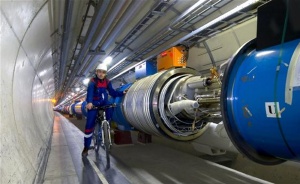Jun 16 2009
CERN's Large Hadron Collider (LHC), the world's largest and most powerful particle collider, is scheduled to restart in fall 2009, and more than 100,000 Analog Devices (NYSE: ADI) data converters will play a key role in helping scientists discover what the universe is made of and how it works by studying the debris created by the collision of sub-atomic particles.
 CERN's Large Hadron Collider (LHC), the world's largest and most powerful particle collider, is scheduled to restart in fall 2009, and more than 100,000 Analog Devices data converters will play a key role in helping scientists discover what the universe is made of and how it works by studying the debris created by the collision of sub-atomic particles. (Photo: Business Wire)
CERN's Large Hadron Collider (LHC), the world's largest and most powerful particle collider, is scheduled to restart in fall 2009, and more than 100,000 Analog Devices data converters will play a key role in helping scientists discover what the universe is made of and how it works by studying the debris created by the collision of sub-atomic particles. (Photo: Business Wire)
"Analog Devices' data converters play an important role inside the Large Hadron Collider. The converters we use need to be radiation-hard and reliable because they must function properly for decades in a high-radiation environment," said Hans Rykaczewski, resource manager, CERN. "The collisions created by the LHC emit energy that can be measured and analyzed once it is converted to a digital data stream. Analog Devices’ converters have the speed and dynamic range we need to measure the energy captured by one of the 64,000-lead tungstate crystals. These crystals measure the energy of photons, electrons and positrons."
CERN, the European Organization for Nuclear Research, is one of the world’s most respected scientific research centers. It uses the world’s largest and most complex scientific instruments to study the basic constituents of matter — the fundamental particles. By studying what happens when these particles collide, physicists learn about the laws of nature. The LHC is located outside Geneva, Switzerland, in a tunnel 100 meters underground and 27 kilometers in circumference. (Watch videos to learn more about CERN.)
Within the LHC, two beams of subatomic particles called 'hadrons' – either protons or lead ions – will travel in opposite directions inside the circular accelerator, gaining energy with every lap. Physicists will use the LHC to collide the two beams head-on at very high energy. Teams of physicists from around the world will analyze the particles created in the collisions using special detectors.
CERN selected ADI’s AD9042 high-speed, low-power, 12-bit ADC (analog-to-digital converter) for use in its detectors. Data converters are the key components that translate real-world phenomena, such as light, sound, temperature, motion and pressure into electrical signals used in a wide array of electronic equipment. Analog Devices is the world’s leading data converter company with 45-percent global market share1.
Data Converters: ADCs and DACs
More designers turn to Analog Devices than any other supplier for the high-performance conversion technology required to bridge the analog and digital worlds in today’s electronic systems. With the industry’s leading portfolio of ADCs (analog-to-digital converters) and DACs (digital-to-analog converters), Analog Devices’ converter products feature the right combination of sampling rates, accuracy, and reduced noise, power, price and package size required in industrial and instrumentation, medical equipment, automotive systems, communications infrastructure, and consumer electronics. Online evaluation tools help customers quickly validate, select, and design in the optimal data converters to reduce design complexity, development schedules, and bill-of-material costs. To view ADI’s ADC selection guide, visit www.analog.com/ADCsearch. For ADC drivers, visit www.analog.com/ADCdrivers. To view ADI’s DAC selection guide, visit www.analog.com/DACsearch.